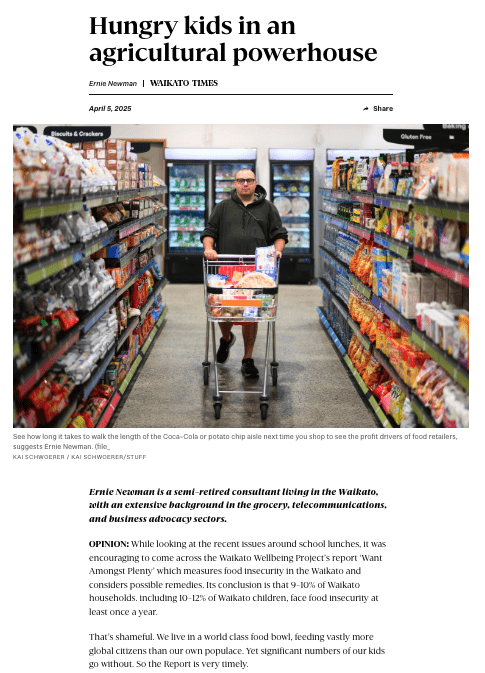Ernie Newman is a semi-retired consultant living in the Waikato, with an extensive background in the grocery, telecommunications, and business advocacy sectors.
OPINION: While looking at the recent issues around school lunches, it was encouraging to come across the Waikato Wellbeing Project’s report ‘Want Amongst Plenty’ which measures food insecurity in the Waikato and considers possible remedies. Its conclusion is that 9-10% of Waikato households. including 10-12% of Waikato children, face food insecurity at least once a year.
That’s shameful. We live in a world class food bowl, feeding vastly more global citizens than our own populace. Yet significant numbers of our kids go without. So the Report is very timely.
Not everyone, of course, will believe its conclusions. The school lunch fiasco has exposed a view by some that people in poverty have only themselves to blame – they should just work harder, or get off addictive substances, or learn to grow and cook vegetables.
But those who take the trouble to understand the different cohorts suffering food deprivation will see a different story. Sure, there are what one Minister has called “losers” but there are many more. Immigrants from poorer countries who are being exploited with super-low wages. Working poor who despite earning a minimum wage or more, simply cant afford to feed a family properly after paying rents that once would have been considered extortionate. People whose journey through life was derailed at the outset through exposure to fetal alcohol syndrome, or drugs, or domestic violence, or neglect. Or who never attended school regularly due to lax parenting, or lack of petrol, or the money for books and clothes.
So Waikato must take the findings of the Project seriously.
In a perfect world, making sure the next generation is properly nourished is parents’ responsibility. But if parents fail for whatever reason, it becomes everyone’s problem. This generation’s malnourished kids are a problem, a wasted opportunity, and a direct cost for the next generation. We all have a stake in this challenge.
So what has gone wrong? Three issues come to mind.
First, nutrition has gone out the window in favour of profit margins. The range of foods on supermarket shelves has diminished. That’s not through customer choice nor nutritional considerations, but by supermarkets zeroing in on the most profitable selection of items - whatever they can buy cheapest and add the highest profit margin to. See how long it takes to walk the length of the Coca-Cola or potato chip aisle next time you shop.
And nutritionally, the ultimate obscenity is the school lunch fiasco. Sure, parents are responsible for feeding their kids, but the question is what if anything the state should do if parents can’t or won’t. Surely whatever the state contributes should be high quality, locally managed fare, not some centrally-produced sludge designed solely to meet a politically headline-grabbing price-point.
Second, our political leaders just don’t get it. I’ll make an exception for Finance Minister Nicola Willis who as a working mum of four has shown signs of genuinely understanding the pain others endure. But behind that lies an issue. Way back we had a House of “Representatives” who genuinely reflected the composition of local communities in terms of circumstances, skills and backgrounds. Today’s MPs by contrast seem to mostly come from the same gene pool – a political elite straight from university into parliamentary offices and then into a list seat, with little other work or life experience. No disrespect, but few have ever had to forego a Marmite sandwich.
Third, our food distribution system is broken. The supermarkets have shut down the healthy competitive market in which they once thrived. Instead they’ve built anti-competitive moats around their operations to ensure no new entrant can get in. They’ve targeted and shut down the local butcher and greengrocer. They’ve shut down hundreds of small and medium sized suppliers who in better days would have used their distribution systems to launch innovative products first to the region, then to the country, and then to the world
Thankfully however, Nicola Willis sems to understand. She recently announced a rapid programme to formalise expressions of interest by potential new entrants, consolidate the considerable research already done, and investigate the potential for forced divestment of the existing duopoly – to me that is the preferred option.
But all that will take several years. Meanwhile we in Waikato have hungry kids. Which comes back to the Waikato Wellbeing Project.
Its report proposes a “Kai Challenge Project” designed to reduce the risk and extent of deprivation of healthy food, and lessen the need for charity.
A decade ago I would never have imagined New Zealand having to head down that track. But we need an interim solution. With the best scenario of government action delivering in five years, today’s primary school kids will by then be at college. Many will have progressed without the minimum nourishment to ensure their ability to assimilate education today, let alone live healthy lives as teens or adults. Poor nutrition leads to poor health, poor learning, obesity, and marginalization. It mustn’t continue.
So I would urge all power to the Waikato Wellbeing Project. Its Report draws attention to a critically important issue and suggests a solution. Arguably Waikato, more than most regions, can give the idea a go.


